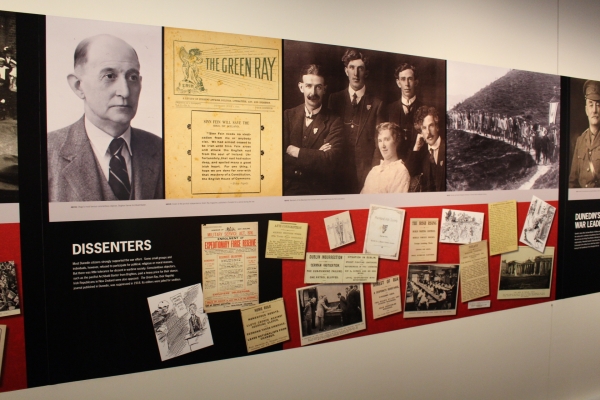Dunedin Exhibition that features a display on Concientious Objectors
Written by Soldiersandorder NZ-FRAn exhibition in the city of Dunedin at Toitū (Otago Settlers Museum) explores the stories of enlistment and departure, conscientious objection and conscription, the horrors and honours of war. In one section titled “Dissenters” they present primary documents on those who refused to fight. The caption on the display said;
“Most Dunedin citizens strongly supported the war effort. Some small groups and individuals, however, refused to participate for political, religious or moral reasons. But there was little tolerance for dissent in wartime society. Conscientious objectors, such as the pacifist Archibald Baxter from Brighton, paid a heavy price for their stance. Irish Republicans in New Zealand were also opposed. The Green Ray, their flagship journal published in Dunedin, was supressed in 1918. Its editors were jailed for sedition.”
The exhibition includes photos of Archibald Baxter, members of the Maoriland Irish Society who supported those who fled conscription. Primary historical documents such as the cover of The Green Ray, and a censored letter from Thomas Cummins, the editor of The Green Ray, jailed for sedition, are on display. A newspaper article is shown that reports Mr J. A. Brailsford pleading guilty to failing to enrol for the army because he was ‘against his conscience’ and attended the Quaker (Society of Friends) church. The article shows that Brailsford was fined five pounds. Another newspaper clipping shows Kevin Byrne fined ten pounds for giving an anti-Conscription address in a public place and William Parker being kept in prison and charged with seditious utterances.
Latest from Soldiersandorder NZ-FR
- Shared Histories exhibition posters in Wellington
- Prime Minister John Key with Baradene College Students and Shared Histories exhibition.
- Shared Histories exhibition Opening in Wellington. Baradene College students Olivia Mendonca and Genevieve Bowler with the Governor-General of New Zealand, Sir Jerry Mateparae.
- Our project makes it to Elizabeth II Pukeahu Education Centre [Wellington] launch - wow
- Project becomes an e-book at Auckland Libraries!
Related items
Media
Search
Who's Online?
The following members are online:
Latest Forum Posts
- No posts to display.
Powered by Technologywise / Design by yojodesign

